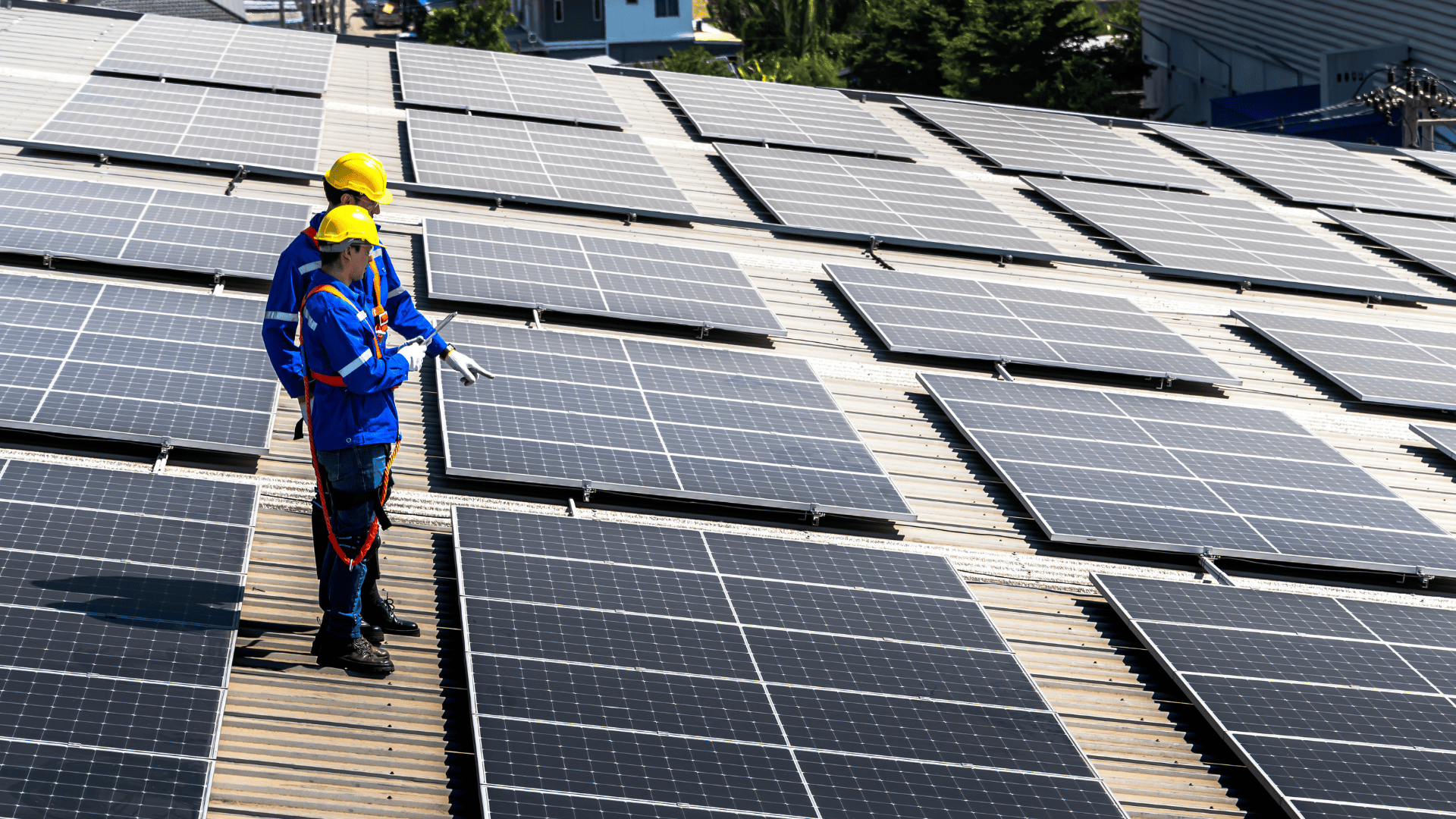August 25, 2022
About Solar Sales
Solar sales is a rapidly growing industry with a competitive market and in order to survive the competition it is necessary to focus on improving the sales process and making it adaptable to the changing circumstances.
The solar industry is projected to grow by over 30% in the next five years, making it one of the fastest-growing industries in the United States.
Since solar sales are part of the particularly thriving industry in most countries with the means to generate electricity using a renewable energy source, the process for it needs to be streamlined for the benefit of sales and engineering teams but especially the sales teams depending on it.
Why do you need a Solar Sales Process?
The solar sales process is an important part of any solar company's business model.
Without an Organized Process with carefully planned Steps to follow, it would be very challenging to expand your Business and Achieve success in the solar industry.
Although the Solar Energy Industry Association estimates that the average customer decision time for “going solar” is 8.9 months, customer acquisition costs make up 10-15 percent of the total price of a solar system.
That's far longer than the average sales cycle of a means of transport. It's also longer than most enterprise software sales cycles. Hence this proves how the solar sales process is the way to succeed for any solar company.
It has three very important functions which are:
- It Allows you to qualify leads
- Helps Build Relationships
- It Assists the sales team in Closing deals
Importance of Solar Sales Process
To restate what we just discussed, the solar sales process is important since it allows you to
- Qualify Leads
- Build Relationships
- Close Deals
However, it comprises additional Key Aspects that make it significant, let's take a look at those as well-
Roadmap for New Opportunities
A well-defined solar sales process gives your company a roadmap to follow when pursuing new business opportunities.
Identify Areas of Improvement
It also helps you keep track of your progress and identify areas where you need to improve your solar sales pitches to put across your opinion on matters related to the sales funnel.
Without a solar sales process, it would be very challenging to expand your business and fight to obtain success in the industry.
Now that we know why we need a solar sales process, let's take a look at how to create one.
How to Create a Solar Sales Process?
Creating a solar sales process can seem like a difficult task, but it doesn't have to be.
These are some very simple steps that even an engineering team can follow and create a super effective solar sales process tailored according to your business.
Define Target Market
The first step in creating a solar sales process is to define your target market, this would include your potential leads or new customers.
You need to Identify the Type of Customer that you are looking to sell your solar pv system to and the Marketing Channels you will employ in the sales cycle.
You also need to decide who you would sell it to:
- Residential Customers? or
- Commercial Customers?
Questions you can ask to Decide on Target Customers:
- What is the average size of the solar system that they are looking for?
- What are the various factors that simulate climate change and can be reasons for promoting solar energy usage?
- How can the environmental benefits be availed?
These questions were just a few examples of the kind of questions you can answer in order to narrow down your target market and make it easier to design a sales process tailored to fit Customer Requirements.
Create a Lead Generation Plan
The second step is to create a lead generation plan.
You need to identify the best way to generate leads for your business.
There are many different ways to generate leads, but some of the most common methods include Online marketing
- Word-of-mouth marketing
- Networking
Once you have a lead generation plan in place, you need to start working on generating leads. The best way to do this is to start implementing your lead generation plan as soon as possible.
Convert leads into customers
The third step is to convert your leads into customers. This is where the solar sales process comes into play.
You need to have a system in place that allows you to take a lead from start to finish and ultimately convert them into a customer.
These are just a few measures that you can take to Convert a Lead into a Customer.
By considering all the factors mentioned above you can build a solar sales process but however, but like any process, this also has a standard set of steps that it is divided into.
The subsequent part of this blog post discusses the steps, the importance, and a little of everything you need to know about the Solar Sales Process and details associated to it.
Steps of a Solar Sales Process
The Solar Sales Process is divided into four main steps:
- Lead generation
- Lead qualification
- Appointment setting
- Closing the sale
Lead Generation
The first step in the solar sales process is generating leads. This can be done in a number of ways, including:
- Online advertising
- Word-of-mouth referrals
- Attending community events
Once you have developed a list of potential leads, it’s time to start qualifying them and move on to the next step.
Lead Qualification
The next step is to qualify your leads by determining their interest level and if they are ready to buy.
Determining this can be done through:
- Phone calls
- Emails.
During these interactions, you are also required to discover their detailed requirements like-
- What kind of budget do they have for a solar installation?
- Technical Details of Sales Software like Aerial imagery, quoting tools, invoicing tools, etc that the customer might not know about and might need insight upon.
- The Financial Details cover all the costs associated with the solar panel system installation, or
- Details about the After-Sales services like professional solar consultation through mobile-friendly applications.
All of this can be accomplished through an email or a phone call to them. After establishing contact and acquiring data that the customers require you can proceed to the next step.
Appointment Setting
Once a lead is Qualified and Ready to Buy, the subsequent step is to set up an appointment with them. This can be done via phone or email.
Things to remember when setting up appointments
- Confirm the time and date of the meeting
- Get their contact information
- Send a confirmation email or text message
Closing the Sale
The final step in the solar sales process is Closing the Sale. This is where you will present your Proposal and Attempt to seal the deal.
If everything goes well, you will sign a contract with your customer and begin work on their solar installation project.
These were 4 steps of the Solar Sales Process explained, Now that you know what each step has to offer, we will tell you how to get the best out of each of the steps.
How to Make the Most of the Solar Sales Process?
The Solar Sales Process can be a daunting task, but in order to make it effortless for you, we made a list of useful tips, so you can make the most out of each step and amplify the likelihood of closing the deal and converting leads.
Research your customer
First, research your potential customer.
This includes understanding their Energy needs and Solar goals.
You can then design a Customized Proposal that meets their explicit needs.
Schedule Site Visits
Next, schedule a site visit to assess the customer's roof and determine if there are any potential obstacles to installing solar panels.
During this visit, it's also important to build rapport with the customer and answer any questions they may have about going solar.
Present a Proposal
After the site visit, it's finally time to put together a Final Proposal and Present it to the customer with an Accurate Quote.
Explain the Benefits
Be sure to thoroughly Explain the Benefits of Solar and How it will save them money on their energy bills.
If the customer agrees to go ahead with the project, Congratulations!
You've just completed a Successful solar sale. Now it's time to get to work installing the panels and getting the customer set up with clean, renewable energy.
Since you just made a sale, you probably realize the importance of Customers in the whole procedure, and you probably also understand the need for CRM, let us now understand the importance of CRM in the process of Solar Sales.
About Sunbase - Solar Sales Tools
With Sunbase, solar companies have a system to manage all aspects of their marketing, sales, leads, and projects in one place.
Sunbase's, all-in-one solar software centralizes management of all the operations, from capturing initial leads to project completion.
Since Sunbase is a could-based software, all data is always accessible and safely stored.
Sunbase All In One Software offers the sales team and sales representatives a complete solution for managing the sales process.
The integrated software and app of Sunbase include the necessary tools for solar professionals and solar installers like lead management software, CRM, solar proposal tool, etc.
When using the suite of solar tools by Sunbase, you can have every tool and software of your need in just one platform making it unnecessary to learn multiple systems or subscriptions or to manage multiple accounts.
Sunbase software includes tools for-
With Sunbase All In One Software, sales teams can streamline their workflow and close more deals for their solar businesses.
Importance of CRM in the Process of Solar sales
The process of selling solar panels is not just about making a one-time sale. In order to be successful, you need to build relationships with your clients and provide them with excellent customer service.
This is where CRM comes in.
CRM stands for Customer Relationship Management. It is a system that helps businesses keep track of their customers and manage their interactions.
By using CRM, you can ensure that you are providing your customers with the best possible experience.
There are many benefits to using CRM in the solar sales process:
Track leads
First, it will help you keep track of your leads and customers. This way, you can follow up with them on a regular basis and nurture your relationships.
Additionally, CRM can help you track the progress of your sales pipeline, so you can see which deals are close to being closed.
Improve customer service
Another benefit of using CRM is that it can help you improve your customer service. By tracking your interactions with customers, you can identify areas where you can make improvements. Additionally, CRM can help you automate some of your customer service tasks, such as sending out thank-you emails after a purchase is made.
Increase sales
Finally, CRM can help increase your sales. By keeping track of your customers and their needs, you will be able to upsell and cross-sell them on products and services that they may be interested in.
Additionally, by providing excellent customer service, you will create loyal customers who are more likely to make repeat purchases.
If you are looking to improve your solar sales process, then consider using CRM. It can help you track your leads, improve your customer service, and increase your sales.
The above three points discuss the importance of customer relationship management (CRM) in the process of selling solar panels.
To expand on this, below are three additional benefits of using CRM:
Build trust with potential customers
By keeping track of interactions and following up with customers regularly, businesses can build trust with potential customers. This is important because it can lead to augmented sales and repeat business from loyal customers.
Low Marketing Costs
Another benefit of using CRM is that it can help businesses reduce their marketing costs.
This is because CRM can help businesses target their marketing efforts toward customers who are more likely to be interested in what they have to offer.
Better Communication
Finally, CRM can help improve communication between businesses and their customers.
By tracking interactions and keeping track of customer information, businesses can make sure that they are providing the Best possible experience for their customers.
Customer relationship management (CRM) is an important tool for any business, most importantly solar businesses. If you are looking to enhance your solar sales process, then automate your business processes with the CRM tool.
We recommend using Sunbase's single solution for all your business requirements. Visit our website for more information, you can also read our blog post -Is All-In-One Sunbase CRM The Best Solar CRM Out There?
Now that you have every bit of information relating to the process of solar sale, as a thank you for reading the article up to here, we jolted down a few very common things you need to know in order to succeed in solar sales.
Tips for succeeding in solar sales
Solar sales can be a tough gig. You're constantly having to persuade people to switch to solar power, which can be a hard sell for some folks.
But if you want to succeed in solar sales, there are a few things you can do.
Knowledge about Products
For starters, it's important to be acquainted with the products and services you're offering. People will often have questions about how solar installers work, and it's important that you answer confidently.
This is a point that frequently features in a lot of blog posts relating to Solar installations. It is because Solar companies simplify the process of installing solar systems.
However, Remembering technical details or even basic details without something slipping out of your mind is difficult.
The resolution for this is that the Sales Representatives can incorporate the details in their solar sales pitch and practice it before attending sales calls.
Attitude is Everything
People tend to feel good around salespeople with a collected attitude. It is no surprise that maintaining a positive attitude is essential as it makes you approachable as a salesman.
Potential customers are more likely to sign on with you if they see that you're devoted to what you're doing and also trying to make them feel inclusive.
Stay organized
Finally, staying organized is crucial in any sales job.
Make sure you keep track of your leads and follow up with them in a timely manner. If you can do these things, you'll be well on your way to success in solar sales.
We hope that these Tips assist you when you make a sale and we guarantee that by following the Above Steps will help you through your journey to Evolve into an ideal Solar Salesman.
How do you Close a Sale the right way?
Call-to-Action (CTA) is the answer.
The Best Way to Close a Sale is by Urging (Not forcing) the customers to react.
Basically, What we mean is that you must have a Call-to-Action (CTA) at the end of your sales pitch that asks the Customer to understand everything about Solar Energy properly and Contact a Trusted Installer.
This method will ensure that you make a sale while helping you to build meaningful connections based on faith, with the potential customers.
Conclusion
We hope that this blog post has helped you understand the solar sales process and how important it is to use a CRM tool to automate your business processes.
If you are looking for an all-in-one CRM solution, we recommend Sunbase.
I agree to receive marketing messaging from Sunbase at the phone number provided above. I understand data rates will apply, and can reply STOP to OPT OUT.







